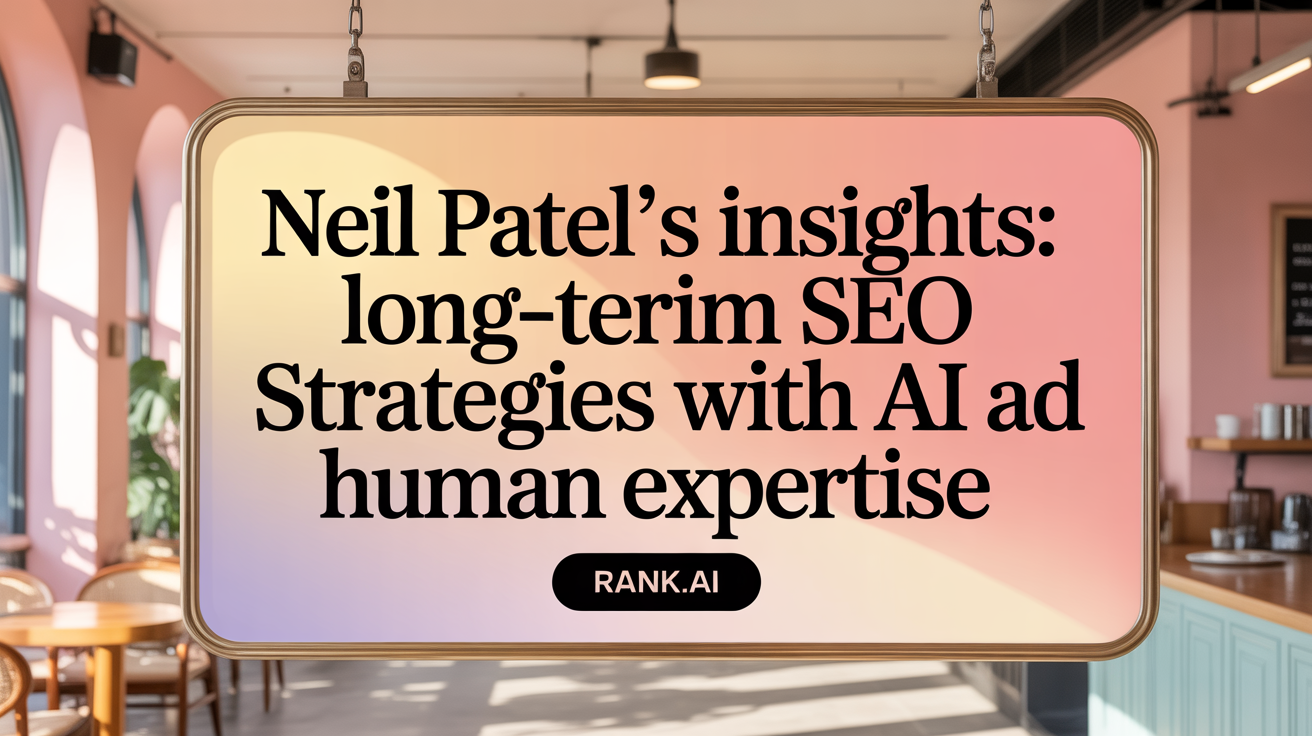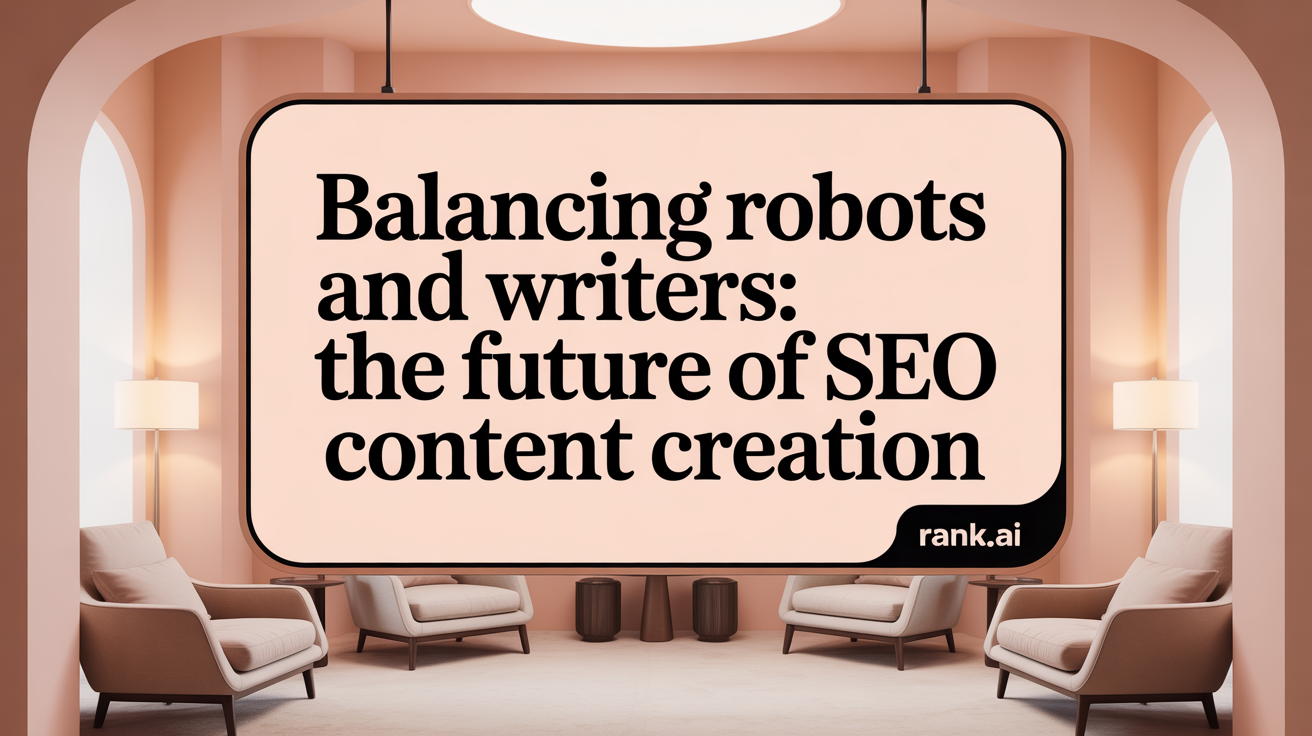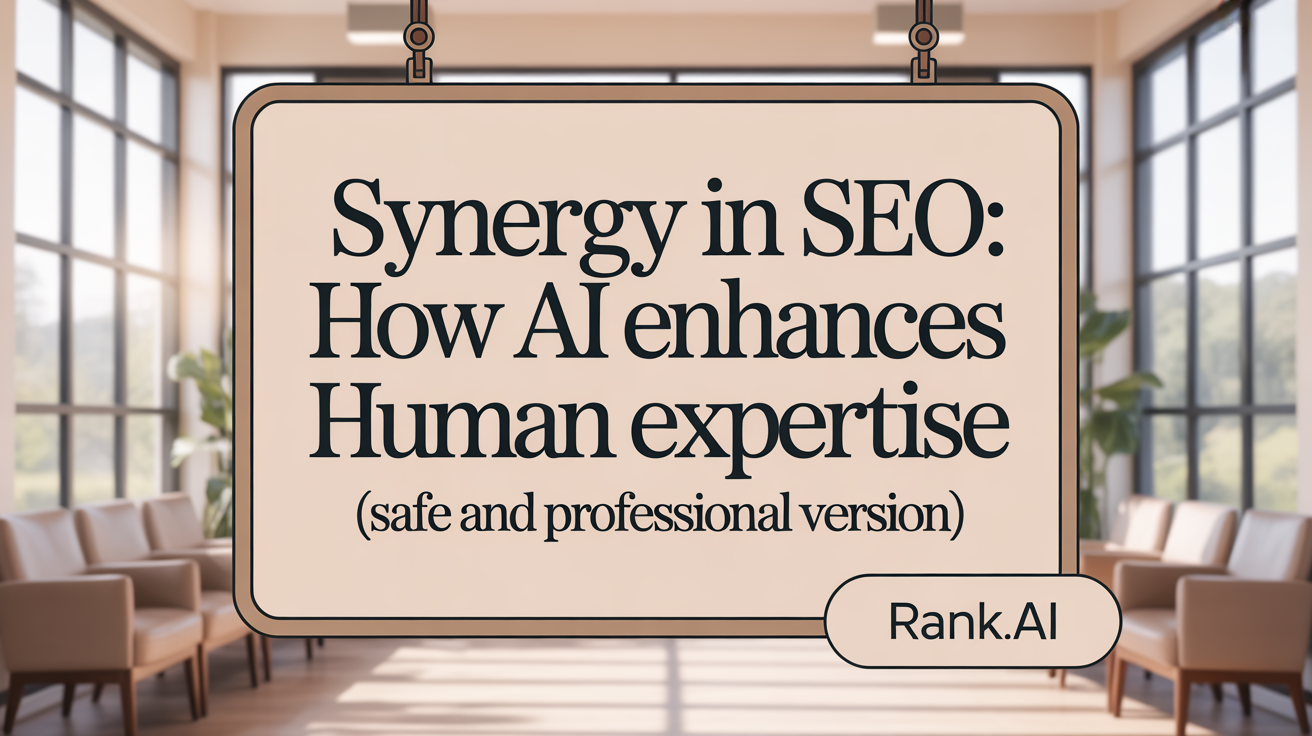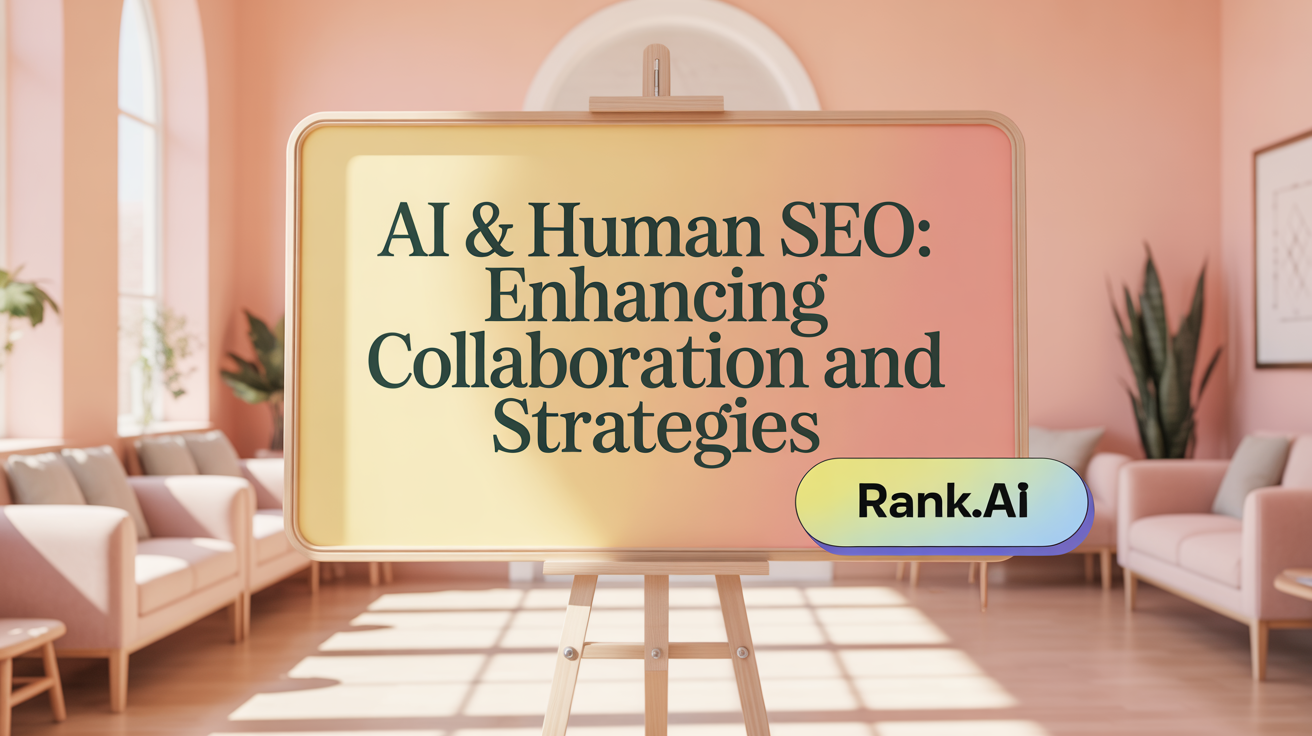Exploring the SEO Effectiveness of AI vs Human Content Creation
In the evolving world of digital marketing, the debate between AI-generated and human-generated SEO content is intensifying. Both methods offer unique strengths and challenges in driving search rankings, traffic, and engagement. This article examines key performance metrics, ranking outcomes, and traffic impacts based on recent studies and experiments, helping marketers understand which approach produces better SEO results and why a hybrid strategy may offer the best of both worlds.
Key Facts on AI vs Human SEO Content Performance
- Controlled experiments show human-generated content ranks higher (median rank 4.4) compared to AI (6.6).
- Over five months, human pages attracted 5.44 times more visitors than AI pages, indicating greater engagement.
- Visitors per minute were 4.10 for human content versus 3.25 for AI, highlighting better user engagement with human-created content.
- Despite AI's rapid content generation, depth, originality, and engagement remain superior in human content, affecting long-term rankings.
- Neil Patel's 12-month study confirms greater visibility and traffic for human content with an average rank of 4.4 versus 6.6 for AI.
- Human content consistently outperforms AI in maintaining interest and trustworthiness over long-term periods.
- AI excels at scaling, speed, and efficiency but lacks emotional intelligence and originality, which are crucial for top SEO.
- A hybrid strategy, combining AI-generated drafts and human refinement, optimizes SEO success by balancing efficiency and authenticity.
- Future SEO success depends on collaborative use of AI’s analytical power and human creativity to produce trustworthy, engaging content.
- Google’s E-E-A-T guidelines favor human-authored content that demonstrates Experience, Expertise, Authority, and Trustworthiness.
1. SEO Ranking and Traffic Performance: Insights from Controlled Experiments
How do the performance, ranking, and traffic impacts of AI-generated content compare to human-generated SEO efforts?
AI content creation tools like ChatGPT, Jasper, and Copy.ai have revolutionized SEO by enabling quick, scalable, and cost-effective production of digital content. They excel at generating large volumes of keyword-optimized material efficiently, helping websites swiftly populate pages and rank for numerous search terms.
Despite these advantages, recent controlled experiments, such as the one conducted by the Reboot agency in 2024, reveal that human-generated content often outperforms AI in actual search rankings. In this study, five domains with human-written content achieved a median rank of 4.4, whereas those with AI-produced content struggled at an average median rank of 6.6. This statistically significant bump highlights that human content generally offers more depth, originality, and engagement, which are crucial for higher rankings.
Traffic metrics further underscore this difference. Over a five-month period, human-created pages attracted roughly 5.44 times more visitors than their AI counterparts. When normalized per minute spent on creation, human content drew 4.10 visitors per minute versus 3.25 for AI. This suggests that, beyond initial rankings, user engagement and trust tend to favor human-authored material.
Such experiments help isolate variables and demonstrate that, while AI can rapidly generate SEO-ready content, it often lacks the nuance, emotional resonance, and contextual understanding that drive higher user engagement and long-term ranking stability. AI’s role is increasingly viewed as a supportive tool—handling routine tasks, keyword research, and data analysis—while strategic, creative, and nuanced content remains a human forte.
In the evolving landscape of SEO, the most successful approaches combine these strengths. AI boosts efficiency and scalability, and human oversight ensures content quality, authenticity, and audience connection. Studies indicate that blending AI’s rapid output with human refinement produces the best balance of ranking performance, traffic growth, and engagement.
Summarizing the Data
| Aspect | AI Content | Human Content | Additional Details |
|---|---|---|---|
| Median Google Rank | 6.6 | 4.4 | Signifies higher placement for human content |
| Traffic over 5 months | Lower (by a factor of 5.44) | Higher | Human content consistently attracts more visitors |
| Visitors per minute | 3.25 visitors | 4.10 visitors | Human content outperforms AI in user engagement |
| Content quality implications | Less engaging, more generic | Original, emotional, compelling | Human content’s ability to connect emotionally influences ranking and trust |
Moving Forward: Strategy and Insights
While AI-driven tools have made significant strides in content efficiency, their limitations mean they are best utilized as part of a hybrid strategy. Incorporating AI for initial drafts, outlines, and bulk data processing can streamline workflow. Nonetheless, human editors and writers play an essential role in contextualizing, personalizing, and validating AI content.
Google’s emphasis on E-E-A-T—Experience, Expertise, Authority, and Trustworthiness—favors human-authored content that demonstrates these qualities convincingly. As search algorithms refine, balancing AI efficiency with human nuance remains the optimal approach for superior SEO performance.
2. Long-Term SEO Impact: Neil Patel’s Study on Traffic and Engagement

How do the performance, ranking, and traffic impacts of AI-generated content compare to human-generated SEO efforts?
Neil Patel's comprehensive 12-month research project examined the SEO performance of AI-generated versus human-crafted content across a diverse set of websites. The study included 68 different sites with a total of 744 articles, aiming to uncover how each type influences search rankings and overall traffic.
The findings highlighted a clear advantage for human-generated content in attracting and maintaining visitor interest over time. Human content consistently ranked higher on search engine results pages (SERPs), reflected in an average-ranking position of 4.4, compared to 6.6 for AI content. This ranking disparity directly influenced visibility, with higher rankings leading to increased organic traffic.
Over a five-month period, human-led content drew a remarkable 5.44 times more traffic than its AI counterparts. This was quantified through engagement metrics such as visitors per minute spent on page. Specifically, human content attracted approximately 4.10 visitors each minute, whereas AI-generated pages saw only about 3.25 visitors per minute. These figures suggest that users find human-authored content more engaging, trustworthy, and aligned with their informational needs.
AI’s ability to produce vast quantities of SEO-optimized content swiftly helps in scaling efforts and maintaining a large pipeline of material. However, the long-term impact reveals that AI’s rapid output does not automatically translate into superior engagement or rankings. Instead, it is the emotional resonance, storytelling, and nuanced understanding unique to humans that foster deeper user connections.
This difference underscores the importance of human creativity and authenticity in SEO strategy. While AI can effectively handle data-driven tasks and initial content frameworks, it lacks the emotional intelligence essential for compelling storytelling and genuine audience engagement. This deficiency may limit its ability to generate the loyalty and trust necessary for sustained SEO success.
The study's results emphasize that, despite AI’s efficiency in terms of speed and volume, the human touch remains vital for achieving enduring SEO growth. Investing in human content creation ensures that audiences are not only attracted to the pages but also engaged, ultimately leading to improved rankings and brand loyalty over time.
Can AI Enhance SEO Without Replacing Humans?
How is AI transforming SEO automation and accuracy?
AI's role in SEO has become increasingly prominent through automation and precision in various tasks. Tools powered by machine learning analyze vast data sets to identify effective keywords, optimize content structure, and improve search rankings quickly. For example, AI can process search patterns, recommend keywords, create meta descriptions, and even generate entire drafts, making SEO efforts more efficient. AI-powered platforms like Jasper and Copy.ai help streamline routine tasks such as content creation and data analysis, leading to faster turnaround times. This automation allows SEOs to focus more on strategy and less on manual data crunching.
Why is human oversight still crucial in SEO?
Despite AI's advances, human strategic oversight and creativity remain essential. Human expertise guides the nuanced understanding of audience intent, cultural relevance, and emotional connection that AI cannot fully grasp. Content creators add storytelling, brand voice, and emotional resonance—elements vital for genuine engagement and authenticity. Moreover, humans ensure that content aligns with evolving algorithms, ethical standards, and brand values. They evaluate AI outputs critically, fact-check, and inject originality, ensuring high-quality, trustworthy content.
What are AI’s limitations in emotional intelligence and ethics?
AI currently struggles with emotional intelligence, a crucial aspect of effective content that influences decision-making and brand loyalty. It cannot genuinely understand or replicate nuanced human feelings like empathy or cultural context. Additionally, AI-generated content raises ethical concerns, including risks of plagiarism, bias, and inadvertent offensive language. Since Google and other search engines emphasize Experience, Expertise, Authority, and Trustworthiness (E-E-A-T), overly automated or unvetted AI content may be penalized or rank poorly. Ensuring ethical standards requires human judgment to review and modify AI-produced material.
How can collaboration between AI tools and SEO professionals be beneficial?
Combining AI capabilities with human insight offers the best of both worlds. AI handles large-scale, repetitive tasks—such as keyword clustering, data analysis, and initial drafts—saving time and resources. Human professionals then refine content, add creative storytelling, and ensure it meets quality standards. This hybrid approach boosts productivity while maintaining authenticity and engagement. Studies and case analyses from 2024 show that AI-assisted content can rank quickly, but higher user engagement is often achieved when humans oversee the process, ensuring that the content resonates emotionally and culturally.
What does the future hold for AI and human SEO cooperation?
The future of SEO likely involves a collaborative model, where AI tools become integral to routine operations, leaving humans to focus on strategic, creative, and ethical considerations. As AI continues to improve in generating natural language and understanding user intent, its role will expand in supporting data-driven decisions and scaling content efforts. Nonetheless, human oversight will remain vital for maintaining authenticity, ensuring compliance with evolving guidelines like Google's E-E-A-T, and fostering deep connections with audiences. The most effective strategies will leverage AI’s efficiency with human creativity, producing content that is both optimized and meaningful.
Overview of AI’s and Human’s roles in SEO success
| Aspect | Artificial Intelligence | Human SEO Experts | Why It Matters |
|---|---|---|---|
| Content Creation | Rapid drafts, keyword optimization | Creativity, storytelling | Creates engaging, authentic content |
| Data Analysis | Large dataset processing, trend spotting | Strategic judgment | Guides long-term growth and brand alignment |
| Emotional Resonance | Lacks genuine understanding | Empathy, cultural insight | Connects emotionally with audiences |
| Ethical Considerations | Risk of bias, plagiarism | Ethical oversight, integrity | Ensures trustworthy, compliant content |
| Speed and Scale | Fast, scalable, cost-effective | Quality, nuance, customization | Balances efficiency with user relevance |
| Future Outlook | Continual improvements, integration | Strategic adaptation | Drives innovation within content marketing |
Ultimately, integrating AI with human expertise creates a resilient, adaptive SEO strategy. By harnessing AI’s speed and scalability alongside the creative and ethical strengths of humans, businesses can produce high-quality, impactful content that ranks well and truly engages audiences.
Advantages and Disadvantages of AI vs Human Content Creation for SEO

What are the advantages and disadvantages of AI versus human content creation for SEO?
AI content creation brings remarkable speed, scalability, and consistency, making it a valuable tool for large-scale and time-sensitive projects. Powered by machine learning and natural language processing, AI tools like ChatGPT, Jasper, and Copy.ai can swiftly generate articles, outlines, and keyword suggestions, helping to optimize content for search engines efficiently. This rapid production capability allows businesses to maintain a steady publishing schedule, improve keyword targeting, and reduce costs.
However, AI-generated content has notable limitations. It often struggles with creativity and emotional resonance, which are vital for engaging readers and building trust. AI tools tend to produce text that can feel generic, repetitive, or lacking in authentic voice, as they lack genuine understanding of nuanced human experiences and cultural relevance. Additionally, there are concerns about plagiarism risks, as AI may inadvertently produce content similar to existing sources, and search engines like Google scrutinize AI content for originality, which can lead to penalties if not carefully managed.
In contrast, human-produced content excels in originality, emotional engagement, and authentic storytelling. Creators such as bloggers, copywriters, and industry experts craft content that resonates deeply with audiences, fostering stronger connections and trust. Human writers are equipped to incorporate empathy, cultural relevance, and strategic messaging tailored to specific brand voices, which enhances overall engagement and authority.
The main challenges with human content involve longer production times, higher costs, and the potential for inconsistencies in tone or quality. Such resource demands can limit scalability, especially for smaller organizations with tight budgets.
To harness the strengths of both, a hybrid approach has gained prominence. Combining AI’s rapid data analysis, keyword optimization, and outline generation with human oversight, editing, and creative input creates high-quality, SEO-optimized content efficiently. This blended method leverages AI’s analytical power while ensuring content retains emotional depth, originality, and authenticity.
Overall, optimizing SEO in today’s evolving landscape involves balancing the speed and scalability of AI with the nuanced, creative talents of human content creators. Proper ethical considerations, adherence to search engine guidelines, and strategic oversight are crucial to maximize benefits and mitigate risks associated with both approaches.
How AI Tools Complement Human SEO Expertise

How can AI tools support or complement human SEO strategies?
AI tools have become vital allies in the world of search engine optimization. They excel at automating mundane but essential tasks, freeing up human experts for more strategic and creative endeavors.
One of the foremost advantages of AI in SEO is its ability to handle keyword research efficiently. AI-driven platforms analyze vast amounts of search data rapidly, identifying high-potential keywords and trending topics that might take humans hours or days to uncover. This swift processing allows businesses to stay ahead of competitors by aligning content with current search intent.
Technical audits are another area where AI shines. These tools can scan websites for issues related to site speed, mobile-friendliness, and crawl errors, providing instant reports and recommendations. Such real-time insights enable prompt corrections, enhancing site performance and user experience.
Content optimization is further streamlined by AI. Natural Language Processing (NLP) models can suggest modifications to improve readability, keyword placement, and SEO compliance. While AI can generate drafts or outlines, human oversight ensures that the content maintains the brand voice, emotional resonance, and ethical standards.
AI’s analytical capabilities extend to understanding search trends and user intent. By examining search patterns, AI helps craft content strategies that better meet audience needs, which is crucial in adapting to evolving search behaviors, including new features like voice search and Search Generative Experience (SGE).
Supporting tasks such as backlink analysis and competitor monitoring also benefit from AI. These tools identify valuable backlink opportunities, track backlink profiles, and alert marketers about shifts in competitor rankings, enabling proactive strategy adjustments.
Moreover, AI applications facilitate adaptation to the latest search features. Voice search optimization and SGE demand understanding of conversational language and complex queries. AI can analyze voice search data and help tailor content strategies to align with these new formats.
Ultimately, AI enhances the efficiency, accuracy, and scope of SEO efforts. When combined with human expertise—focused on strategic planning, creative storytelling, and maintaining brand authenticity—AI tools create a synergistic approach, resulting in more effective, responsive, and ethical SEO practices.
This collaboration ensures that businesses leverage the speed and precision of AI while preserving the nuance, emotional intelligence, and strategic vision that only humans provide. Together, they foster a dynamic and adaptable SEO environment prepared for future search engine developments.
Roles, Strengths, and Limitations of AI and Human SEO Expertise

What roles, strengths, and limitations do AI and human expertise have in SEO?
AI and human expertise play complementary roles in shaping effective SEO strategies. AI enhances search engine optimization by automating routine technical tasks, analyzing vast datasets rapidly, generating content, and pinpointing optimization opportunities with high efficiency. Its strengths include speed, scalability, consistency, and the ability to process large amounts of data to identify high-ranking keywords and optimize content for search engines.
However, AI tools have notable limitations. They often lack emotional intelligence, which is crucial for creating engaging and relatable content. AI-generated text can also contain factual inaccuracies or produce repetitive and generic outputs, risking issues like plagiarism and Google penalties. Since AI does not understand context or nuance fully, content produced solely by machines may fall short in providing the depth, originality, and emotional resonance that users seek.
On the other hand, human expertise brings creativity, storytelling ability, and ethical judgment—elements vital for engaging audiences and building trust. Human SEO professionals have a nuanced understanding of audience needs, cultural relevance, and brand voice. They excel at crafting content that resonates emotionally, demonstrates authority, and adheres to evolving search engine guidelines centered around E-E-A-T (Experience, Expertise, Authority, Trustworthiness).
While AI is excellent for data analysis and content automation, it cannot replace the strategic and creative insight offered by humans. Human oversight ensures content is accurate, ethically sound, and tailored to audience intent. The collaboration between AI and human expertise fosters innovation, allowing for more comprehensive and impactful SEO practices. Combining AI’s efficiency with human creativity results in more nuanced, authentic, and trustworthy content—leading to better long-term SEO performance.
Overall, the most successful SEO strategies today hinge on leveraging AI’s capabilities to handle routine and analytical tasks while relying on human insight for innovation, storytelling, ethical oversight, and strategic refinement. This hybrid approach optimizes productivity, maintains content quality, and aligns with search engines’ increasing emphasis on value and authenticity.
Integrating AI and Human Talent: The Future of SEO Success
The ongoing evolution of SEO continues to highlight the complementary strengths of AI and human content creation. While AI excels in rapid, scalable, and data-driven content production, its limitations in creativity, emotional resonance, and authenticity prevent it from fully replacing human expertise. Human-generated content remains critical for establishing trust, engagement, and alignment with evolving SEO principles such as E-E-A-T. Evidence from controlled experiments and longitudinal studies consistently demonstrates the superior ranking, traffic, and engagement results associated with human input. However, the best SEO outcomes emerge when AI’s efficiency and precision are combined with human creativity, strategic insight, and ethical oversight. Embracing this hybrid approach allows marketers to leverage cutting-edge AI tools alongside invaluable human skills, ensuring content that ranks well, resonates deeply, and delivers sustained value in a competitive search landscape.
References
- AI vs Human Content: Which Performs Better in SEO? - Asclique
- AI VS Human: Who Writes Better Blogs That Get More Traffic?
- AI vs. humans: Who really wins at SEO - AMPM, Inc.
- AI Content Versus Human Content: Which Performs Better? - Proofed
- AI vs Human Content What Drives More SEO Results and Traffic
- Does AI Write SEO-Optimized Content 3x Faster Than Human Writers?
- AI vs Humans - The SEO Content Experiment - Reboot Online
- AI Writing vs. Human Writing: Is It Really Better? | Precise Creative



